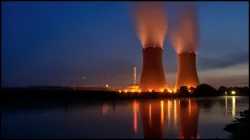Iran further increases its enriched uranium stockpile amid chances of renewed nuclear talks
As of August 17, Iran has 164.7 kg (363.1 pounds) of uranium enriched up to 60 per cent, just short of enough needed to create four nuclear bombs if enriched further. This came as Iran opened doors for restarting negotiations with the US on the now-scrapped nuclear deal.

Vienna: Iran has further increased its stockpile of uranium enriched to near weapons-grade levels in defiance of international demands, according to a confidential report by the UN's International Atomic Energy Agency (IAEA), amid Tehran's willingness to restart negotiations with the United States over stalled nuclear talks.
The report seen by the Associated Press says that as of August 17, Iran has 164.7 kg (363.1 pounds) of uranium enriched up to 60 per cent. hat’s an increase of 22.6 kilograms (49.8 pounds) since the IAEA’s last report in May, which reported Iran's stockpile at 142.1 kg (313.2 pounds). Uranium enriched at 60 per cent purity is just a short, technical step away from weapons-grade levels of 90 per cent. As of August 17, Iran’s overall stockpile of enriched uranium stood at 5,751.8 kg (12,681 pounds). “The continued production and accumulation of high enriched uranium by Iran, the only non-nuclear weapon state to do so, adds to the agency’s concern,” it concluded.
According to the IAEA, around 42 kg (92.5 pounds) of uranium enriched to 60 per cent is the amount at which creating one atomic weapon is theoretically possible if the material is enriched further to 90 per cent. IAEA chief Rafael Mariano Grossi had previously warned that Tehran has enough uranium enriched to near-weapons-grade levels to make “several” nuclear bombs. “The continued production and accumulation of high enriched uranium by Iran, the only non-nuclear weapon state to do so, adds to the agency’s concern,” it concluded.
Iran defies international norms
Talks between Iran and the UN nuclear watchdog over restarting a suspended 2015 deal with the US. The report on Thursday marks a new low in relations between Iran and the IAEA. After President Masoud Pezeshkian's victory, the IAEA congratulated him and offered to send the agency’s chief to Tehran “to re-launch the dialogue and cooperation between the agency and Iran,” the report said. But while the newly elected Iranian president confirmed “his agreement to meet” with the IAEA chief, no thing has moved forward on this since.
Iran's stockpile of 164.7 kg is estimated to be 2 kg short enough of enriching further for four nuclear bombs. Under the original nuclear deal, struck in 2015, Iran was allowed to enrich uranium only up to 3.67 per cent purity, maintain a stockpile of about 300 kg and use only very basic IR-1 centrifuges — machines that spin uranium gas at high speed for enrichment purposes.
The 2015 deal saw Tehran agree to limit enrichment of uranium to levels necessary for generating nuclear power in exchange for the lifting of economic sanctions. The deal collapsed after the Trump administration in 2018 pulled the United States out of the agreement, leading Iran to abandon all limits the deal put on its programme.
Iran opens doors for renewed talks with US
The IAEA report further says that Tehran has also not reconsidered its September decision to ban the agency’s inspectors from monitoring its nuclear program and that IAEA surveillance cameras remain disrupted. This came after Iran's Supreme Leader Ayatollah Ali Khamenei expressed willingness to restart negotiations over the now-scrapped nuclear deal, saying there was "no harm" in engaging with its "enemy."
Ayatollah Ali Khamenei's remarks set clear red lines for any talks taking place under the government of reformist President Masoud Pezeshkian and renewed his warnings that Washington wasn't to be trusted. "This does not mean that we cannot interact with the same enemy in certain situations," Khamenei, 85, said, according to a transcript on his official website. "There is no harm in that, but do not place your hopes in them."
Asked for comment, the US State Department told The Associated Press: "We will judge Iran's leadership by their actions, not their words." "We have long said that we ultimately view diplomacy as the best way to achieve an effective, sustainable solution with regard to Iran's nuclear program," it said. "However, we are far away from anything like that right now given Iran's escalations across the board, including its nuclear escalations and its failure to cooperate" with the IAEA.
ALSO READ | Iran ready to negotiate with US over its nuclear program, says 'no harm in engaging with enemy'